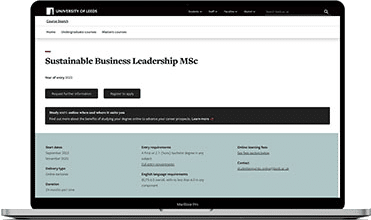Meet Dr Laura Smith, Lecturer for Sustainable Business Leadership
Sustainable Business Leadership Dr Laura Smith is a Lecturer on the online Sustainable Business Leadership Masters and leads both the Sustainability and Business, and Policy, Governance and Sustainability modules. She is an expert in sustainability and business with a particular interest in sustainable development within the extractive industries.
Dr Laura Smith is a Lecturer on the online Sustainable Business Leadership Masters and leads both the Sustainability and Business, and Policy, Governance and Sustainability modules. She is an expert in sustainability and business with a particular interest in sustainable development within the extractive industries.
In this Q&A, we speak to Laura about her career journey, the programme she’s a part of, and some of her top tips for prospective students.
Learn more about our Sustainable Business Leadership courseQ: Firstly, please, could you begin by introducing yourself?
A: My name is Dr Laura Smith, I’m a Lecturer in Sustainability and Business in the School of Earth and Environment at the University of Leeds, and the module leader for two modules on the online Sustainable Business Leadership Masters programme.
I joined the University of Leeds as a part-time PhD student in 2012, and I’ve been teaching in various roles in the School of Earth and Environment and the School of Politics and International Studies since around 2014.
Q: Could you tell us a little bit more about your experience? How did you get to where you are today?
A: I started with a degree in International Business Studies and from then I became interested in issues of human rights and social justice.
So, I began working in the third sector, firstly as a Human Rights Campaigner and then at a trade justice charity. We set up a social enterprise which connected young people in the UK to coffee and tea farmers in Africa and India. This was an ethical trading initiative where young people gained business skills and farmers received a fair price for their products.
From there I decided to go back to university and study for a PhD to continue exploring my interest in corporate social responsibility and the role of multinational companies in sustainable development. I had the opportunity to study the early stages of the oil industry in Uganda in East Africa which is what I did my PhD on, and I looked at how companies were engaging at the local level around community development and corporate social responsibility.
Q: And why sustainability? Where does your passion for this subject stem from?
A: My passion for the subject came from becoming aware of inequalities in the global system during my studies. For example, how unequal the impacts of environmental degradation were being experienced, and how the growth of certain industries from wealthy countries were causing pollution and poverty for communities in other parts of the world who were not benefiting from that. As we know, it’s the communities most affected by climate change now that have had the lowest carbon footprint.
So, sustainability really covers some of the defining issues of our time, whether it’s climate change, species loss, waste and ocean pollution, poverty, and inequalities.
My interest now has expanded into looking at the extractive industries and their role in producing minerals that we need for the low carbon transition. Many of these minerals are in Africa and South America where there’s a long history of contentious issues around minerals extraction and issues around human rights, social and environmental justice.
Q: What would you say is your main area of expertise in sustainability? And do you have any particular research interests?
A: My research has been in the extractive industries, really looking at this idea of sustainable development in an industry that’s very contentious. I’ve been looking at the start of industries, how companies gain their social license to operate, how they implement community development, their relationships with communities, how those communities can drive accountability, and how they can perhaps benefit from some of the developments taking place.
Now, as we move to the low carbon transition, I’m starting to look at the critical minerals sector, examining some of the main issues, and how we can try to address some of the complex challenges around that.
Uncover the top research projects at the Leeds School of Earth and EnvironmentQ: Could you tell us a bit more about the programme? What does it involve and who’s it for?
A: The Sustainable Business Leadership programme is a Masters degree being offered by the University of Leeds. It’s a fully online, distance learning course and it’s delivered by the School of Earth and Environment, Leeds University Business School, and the Digital Education Service, which means it brings together expertise in sustainability, business, and digital learning.
We’ve created this innovative programme through these partnerships for students working across many different sectors who want to change their career focus to sustainability, lead sustainability in their own organisation, or learn about sustainable business and gain new skills.
Students take several modules over a two-year period, starting with foundation modules in sustainability to give a foundation in thinking critically about sustainability and the role of business. Then, they go on to take more modules focused on sustainable business skills. For example, thinking about business strategy for sustainability, innovation and complex decision-making.
They then take a Research Project module in which they can then really pursue their own interests in sustainability and business at the end of the course.
Learn more about the online Sustainable Business Leadership MastersQ: And the course is taught fully online – what’s that like and how much interaction do you have with the students?
A: One great aspect of the online programme is that it’s a truly global programme, so we have learners joining from all over the world in every continent, from lots of different industries and sectors. So, students are really getting to learn a lot from their peers on the programme.
As the course is taught fully online, students are across different time zones and engaging with the lessons and activities in their own time. But then they also engage in discussions, for example on discussion boards where they can interact with their peers and their tutors.
We then come together once a week for an interactive workshop and focus on a topic that students can discuss in small groups before we get together and have a group discussion. There’s also interaction with academic staff, and personal tutors through one-to-one tutorials as students work through the programme.
Find out more about the benefits of online learning with LeedsQ: As part of the course, you mentioned that you lead two specific modules: Sustainability and Business and Policy, and Governance and Sustainability. Could you tell us a little bit more about these modules and what students can expect to learn from them?
A: The Policy, Governance and Sustainability module aims to deepen students understanding of the need for sustainability related policy and governance and the complexities of enacting governance over the environment.
We’re looking at various policy instruments available to address sustainability challenges and consider the importance of multi-stakeholder governance and governance across local and global scales. In this module, students critically evaluate different policy instruments and their role in fostering positive environmental change, and we look at various real-world case studies and examples.
In the Sustainability and Business module, we’re taking a critical look at the role of business and exploring those links between sustainability and business, considering the role of business in driving positive change for sustainability.
We consider alternative business models, and look at circular economy, social enterprise, sustainability standards and partnerships between business and social actors in sustainability. And we also consider business as a political actor on the global stage and what the role might be for business. For example, in a degrowth economy.
Q: What are you hoping for students to get out of the course?
A: Through this course, students are gaining a critical and holistic understanding of sustainability and how this links to business and business leadership.
We want our students to think beyond a business-as-usual and typical shared value approach, and instead, really think about alternative and innovative approaches to sustainable business leadership that can drive positive change. We’re at a crucial juncture where we must shake things up and we can’t just continue as we are, so this programme aims to develop skills and knowledge, but also the values that students and business leaders need to meet the pressing sustainability challenges that we’re facing.
Q: Why did you choose to join the University of Leeds?
A: I first joined the University to do my PhD and found that the University of Leeds is one of the top universities in the UK with a fantastic reputation for research-led teaching.
The School of Earth and Environment is also an interesting place to work because of the breadth of work being done in environmental and social research as well. So, there’s natural scientists and social scientists and their research is having real-world impact. And obviously they are great colleagues to work with as well.
Discover the global reputation of the University of LeedsQ: You work closely with both the School of Earth and Environment and Leeds Business School as part of the Sustainable Business Leadership Masters – what’s that collaboration like?
A: The collaboration with Leeds Business School is great because we’ve been able to develop this unique programme that brings together sustainability knowledge and business knowledge from schools that are both recognised for world-leading research. Sustainability is really embedded into this business leadership programme, so it really benefits from the expertise from both of those schools.
Q: Could you give some examples of the different research and expertise that benefit the programme?
A: We’ve really brought expertise from the different faculties into the programme, so we’ve got interviews with leading academic experts and short case studies of their work.
We also have sustainability research being done, for example on decarbonisation projects and business model transitions which are brought in as case studies on to the programme. We also have industry and practitioner interviews from people working on net-zero transition, in community based environmental governance, and industry specialists working on sustainable supply chains and non-technical risk.
Q: If you could give one piece of advice to someone considering studying Sustainable Business Leadership with the University of Leeds, what would it be?
A: I think the course is suitable for people at any stage in their career who want to gain a deeper understanding of sustainability and what their own role might be in driving positive change in society or in their organisation.
If people want to study alongside working, this programme is great in terms of flexibility, and if students want to become part of a dynamic cohort of international students working in really interesting areas, I think my advice is just to take a look at the modules, take a look at the programme, and get in touch to find out how you can get started.

Did you enjoy this blog? Here’s some related sustainability content you may be interested in:

Want to learn more about our online Sustainable Business Leadership course?
Check out the course content and how to apply.

